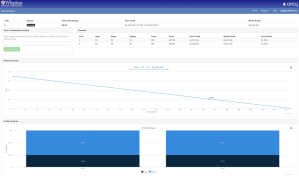Wharton’s team-oriented, negotiation-focused learning tool demonstrates the dynamics of competition and cooperation within a closed market.
 Teams of students act as ministers of an Oil Production Board tasked with setting petroleum production levels for one of three fictional countries in this uniquely effective multi-player simulation. Steeped in game theory, OPEQ creates the perfect conditions for exploring conflict, cooperation and other behavioral relations that affect logical decision-making, while incorporating a number of unexpected events to enhance the complexity of the simulation and interactions of the competing worlds therein.
Teams of students act as ministers of an Oil Production Board tasked with setting petroleum production levels for one of three fictional countries in this uniquely effective multi-player simulation. Steeped in game theory, OPEQ creates the perfect conditions for exploring conflict, cooperation and other behavioral relations that affect logical decision-making, while incorporating a number of unexpected events to enhance the complexity of the simulation and interactions of the competing worlds therein.
Developed by Maurice Schweitzer – Wharton’s premiere professor of Operations and Information Management – in partnership with The Learning Lab, OPEQ immerses students in the intricate world of oligopical oil pricing, where each team attempts to maximize cumulative profits for their own country within a global context. The dynamics of cooperation and competition intensify as the game progresses round over round, and players quickly learn the importance of communication, negotiation, and best-response functions as they strive to achieve Nash equilibrium in an interdependent market.
OPEQ is also highly configurable and easily tailored to teach an array of negotiation and economic principles, with core learning objectives that include: 
- illustrating the dynamics of cooperation and competition (in terms of the tension between self-interest and maximizing cumulative profits);
- exercising strategic negotiating and communication skills to achieve optimal results in a competitive environment;
- exploring oligopoly market structures, with a focus on game theory, the Nash equilibrium and best-response functions;
- observing the fluctuations of price and profit in a competitive world marketplace.
In addition to a user interface stocked with display features that aid students in making informed production decisions, this browser-based application also offers real-time monitoring that allows instructors to track team progress and download game data for comparative strategy and performance analysis. Moreover, it’s packaged with a detailed Teaching Note and six supplemental supporting videos that, together, greatly reduce the time required for faculty to learn, prepare, facilitate, and debrief this top-selling, world-class Negotiation simulation.
For more information on OPEQ, email the team: learninglab@wharton.upenn.edu.



